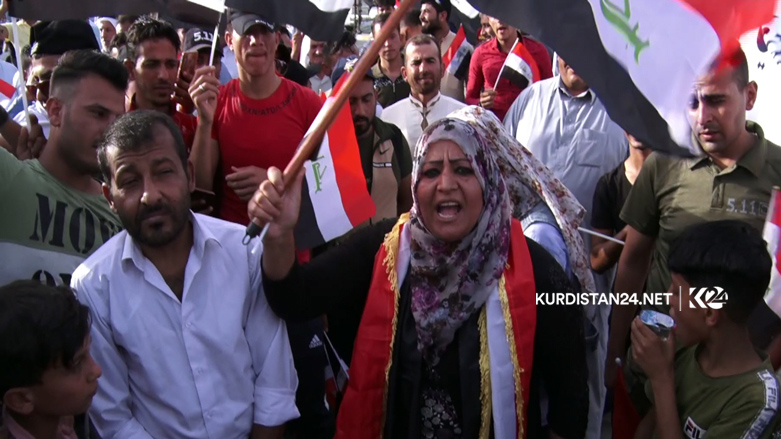MPs call to punish woman who promoted Baath party, Saddam in Kirkuk protest

ERBIL (Kurdistan 24) – Two lawmakers in the Iraqi Parliament on Sunday called for the punishment of a woman who promoted former leader Saddam Hussein and his banned Baath Party during a recent demonstration in the disputed city of Kirkuk.
Dozens of ethnic Arabs gathered on Friday, with several of them carrying Iraqi flags and various signs or banners to protest the recent nomination of a Kurd to be the province's next governor. This came in response to a deal on the nomination that was reached by the Kurdistan Democratic Party (KDP) and the Patriotic Union of Kurdistan (PUK) who together make up a majority bloc in the Kirkuk Provincial Council (KPC).
Read More: Kurdistan's KDP, PUK agree on candidate for Kirkuk governorship
Video footage of the demonstrators shows them standing near the governor's office, with one woman saying, “We are Baathists. We are Saddamis.”
Both statements are references to the former Iraqi regime, led by dictator Saddam Hussein, who launched a campaign of genocide, repression, and forced displacement against the Kurds, among others, during his rule.
Her comments outraged many Kurdish and Iraqi people on social media, many whose families suffered repression and persecution under the former authoritarian rule of the previous government.
“This woman wanted to publish a well-thought-out message to the government, to the political forces, and to the states, as they are saying that they, as the Baath party, are not currently in the executive branch of Iraqi government, but in politics,” warned Rebwar Taha, a Kurdish member of the Iraqi Parliament who is from Kirkuk.
Following the fall of Saddam Hussein’s rule in 2003, his Baath Party was permanently banned in the country and from participation in future governments.
Taha, in a statement, said he believes the Baathists took two courses of action to promote their ideas after 2003, one through the establishment of civil organizations and the other through “terrorist” groups.
The woman, Rana Hamid Ajram, is believed to be the head of the non-governmental organization known as Ahbab al-Rouh.
The Kurdish MP called on Iraqi authorities to investigate the woman “and hold her accountable in accordance with the law banning the Baath Party... considering that the issue is the issue of public opinion.”
Baathists ruled Iraq from 1968 until 2003. They have been accused of ethnic cleansing, genocide, and other widespread grave human rights violations.
Majid al-Waeli, another member of the Iraqi Parliament, called on the Parliamentary Committee of Civil Society Organizations to investigate the activity of Ahbab al-Rouh and to file a lawsuit in the name of the parliament against the group and for the Iraqi Supreme Judicial Council to then refer the case to an appropriate court.
News agencies have reported that local security forces already arrested Ajram, but Kurdistan 24 could not independently verify this.
The Constitution of Iraq, passed in 2005, states in Article 7 that: “Any entity or program that adopts, incites, facilitates, glorifies, promotes, or justifies racism or terrorism or accusations of being an infidel (takfir) or ethnic cleansing, especially the Saddamist Ba'ath in Iraq and its symbols, under any name whatsoever, shall be prohibited. Such entities may not be part of political pluralism in Iraq. This shall be regulated by law.”
However, the Iraqi judiciary in February 2019 stated that no decision had been made to punish those praising or promoting Saddam Hussein and pointed out that any step in this regard should be initiated first by parliament.
In April, Iraqi police forces arrested a man selling wristwatches that displayed the image of Saddam Hussein in central Baghdad.
In late 2018, an Iraqi university announced the expulsion of three of its students who were filmed holding up a picture of the former dictator during a gathering on campus.
Editing by John J. Catherine
